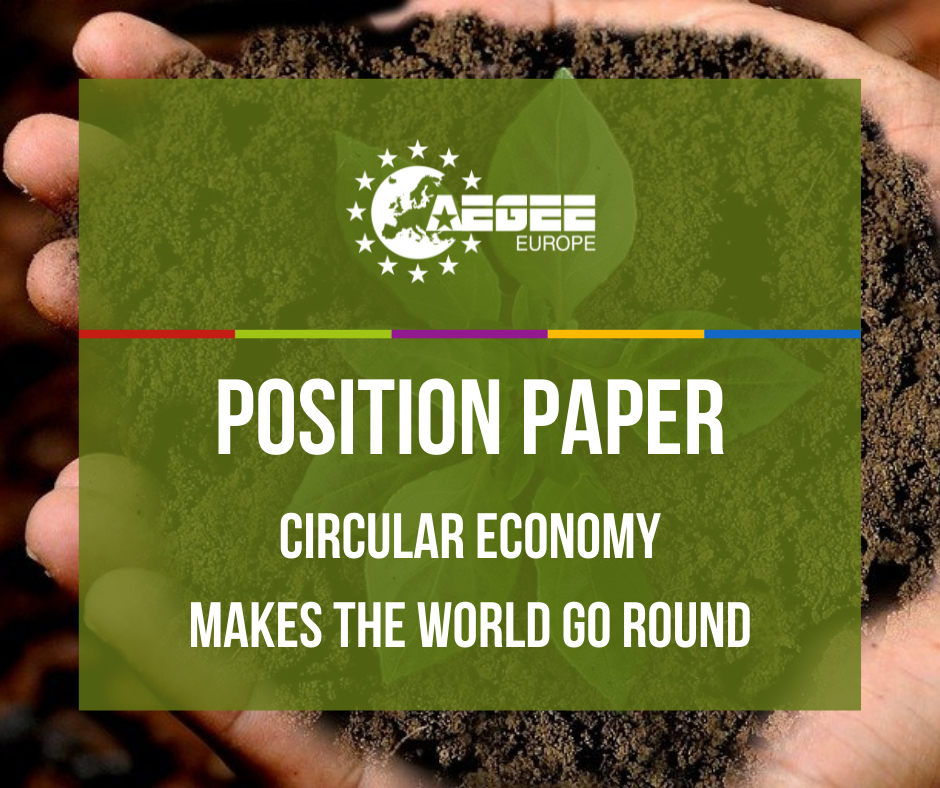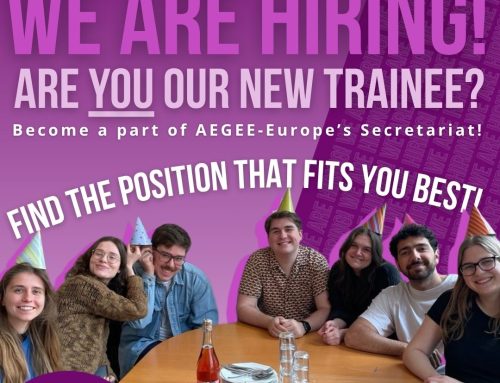CIRCULAR ECONOMY MAKES THE WORLD GO ROUND
Written by Jana Niedringhaus
AEGEE (Association des Etats Généraux des Etudiants de l’Europe/European Students’ Forum) is a non-governmental, politically independent, and non-profit student organisation, which was created in 1985. The mission of AEGEE is the creation of a borderless Europe, based on democracy and respect for human rights, by bringing together 13,000 students in around 150 cities and 38 countries with different cultural backgrounds. We strive for a democratic, diverse and borderless Europe, which is socially, economically and politically integrated and values the participation of young people in its construction and development. Our main goal is to strengthen mutual understanding among young Europeans and bring Europe closer by empowering them to take an active role in society. The current focus areas as defined by the members at a grassroots level are: Climate Emergency, Mental Health, Political Activism and Social Equity.
This paper sheds light on AEGEE’s position towards Circular Economy. AEGEE acknowledges the importance and the urgent need for a more Circular Economy in Europe. The current system is flawed and raw material extraction and systematic (waste) leakages need to be minimized. Especially the focus which is often put on recycling as a solution for the existing waste and resource problems conveys a distorted picture of how the current crisis can be tackled. In addition, due to a lack of education and transparency it is difficult for European citizens to grasp what Circular Economy really entails which makes it harder for citizens to advocate for a change of the existing linear model. Therefore, AEGEE tries to offer a space for non-formal education in the field of Circular Economy, as we believe that this is an important component.
One important aspect which is required for a successful transition to a more Circular Economy is targeted formal as well as non-formal education in order to enable European citizens and particularly youth to make informed decisions and properly advocate for their needs. It should teach relevant skills, like evaluating outcomes of our decisions, systems thinking, having a flexible mindset, communication as well as collaboration and leadership skills. Unfortunately, formal education is currently not equipping students with the right skills. Nevertheless, European citizens and especially young people should be willing to (re)learn and develop skills in order to always be able to question the system and show alternative ways.
Another important part for a transition towards more circularity is the empowerment of consumers. The current system often focuses on recycling which should rather be treated as the last resort. We, as a society, should focus on extending products’ and materials’ lifetimes through designing for repair, by empowering people through relevant legislation, spaces, and education, which highlights the need for EU legislation to set down these rights. Keeping products and materials in use as long as possible as well as a right to repair strengthens communities and (local) economies. Realizing these crucial aspects of Circular Economy requires commitment, transparency and accountability of business.
A key component which could foster both education as well as consumer empowerment is national and European legislation. In this process youth should be a permanent stakeholder, as young people are a main driver of change while at the same time being affected long-term. Legislative barriers need to be removed in order to enable a swift and easy transition to a Circular Economy for producers and consumers. There is still much room for improvements to realize a Circular Economy.
Circular Economy provides opportunities on many different levels. Not only is it a necessary step towards more sustainability but it is also a new way of thinking, approaching problems and valuing resources. AEGEE believes that society needs politics to implement policies for a circular system. In turn, politics needs society to express their needs and especially producers to adapt their behaviour. Circular Economy has several social benefits, such as providing meaningful work and helping to remove the gap to the labour market of disadvantaged groups. Enabling a just and inclusive transition is very important to AEGEE!
AEGEE acknowledges the efforts already being made by the European Union and national governments. However, AEGEE believes that in order to reach climate-neutrality by 2050 and fulfil the goals of the European Green Deal more effort is required. Currently, there is an overall lack of progress in terms of legislation, education, changes of production and consumption patterns, transparency and cooperation. It needs a combined effort of all parts of society. Therefore, we believe that we ourselves have to keep working and improving, but at the same time also producers and decision-makers have to push forward and lead the way. This is the only way we can reach the goal of an economy that is more circular, regenerative, inclusive and which stays within the planetary boundaries!




